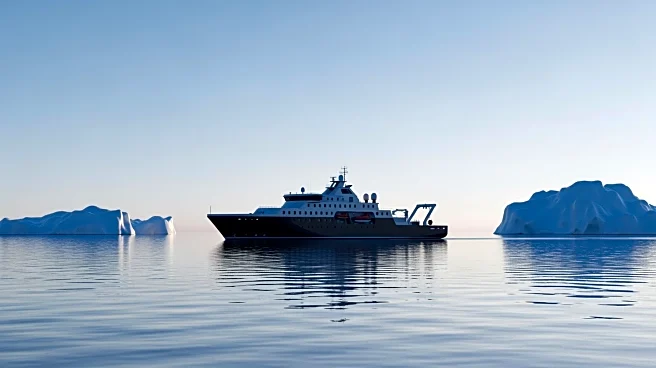What's Happening?
HX Expeditions has introduced two new 'Silent Science Boats' designed to minimize underwater noise pollution in the Arctic and Antarctic regions. These MK 5 vessels are fully electric, featuring RAD Propulsion's
RAD 40 drive system, and are part of HX's commitment to environmental stewardship and scientific integrity. The boats are equipped to transport guest scientists, expedition teams, and travelers for wildlife observations and research with minimal acoustic interference. The initiative aims to phase out traditional petroleum-based engines, enhancing the experience for scientists and guests while reducing environmental impact.
Why It's Important?
The launch of these silent boats is significant as it addresses the issue of sound pollution, which is a major environmental concern in polar regions. Noise pollution can adversely affect marine life, particularly whales, by disrupting their natural behaviors. By reducing underwater noise, HX Expeditions is contributing to the conservation of these sensitive ecosystems. This move also represents a shift towards more sustainable exploration practices, setting a precedent for other expedition companies to follow. The initiative supports scientific research by allowing more natural observations of wildlife, which can lead to better understanding and protection of marine species.
What's Next?
HX Expeditions plans to continue transforming its fleet by replacing traditional combustion engine zodiacs with clean, electric alternatives. This long-term goal aims to further reduce the environmental footprint of their operations in sensitive regions like the Arctic and Antarctic. The success of these silent boats could encourage other expedition companies to adopt similar technologies, potentially leading to industry-wide changes in how marine research and tourism are conducted in remote environments. Continued collaboration with technology providers like RAD Propulsion will be crucial in achieving these objectives.
Beyond the Headlines
The introduction of silent science boats highlights the growing importance of addressing less visible environmental impacts, such as sound pollution, in conservation efforts. It also underscores the role of technological innovation in enabling sustainable practices in exploration and research. As awareness of these issues increases, there may be broader implications for regulatory policies concerning marine operations in protected areas. This development could also inspire further advancements in electric propulsion technology, benefiting various sectors beyond expedition travel.











